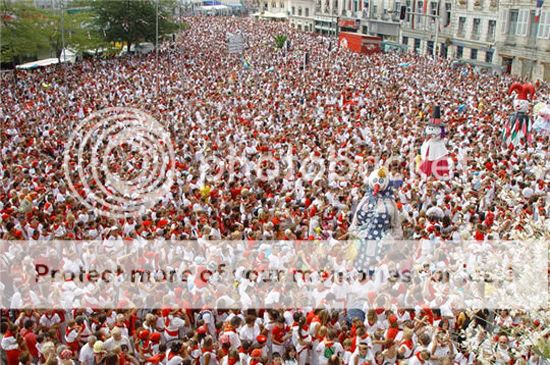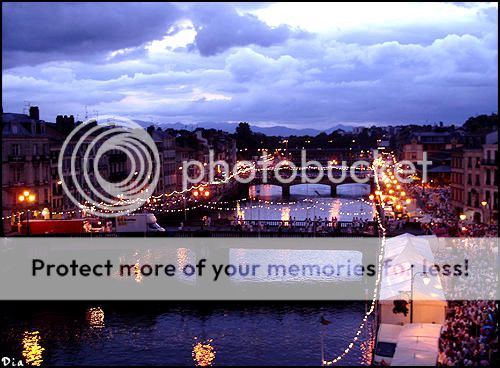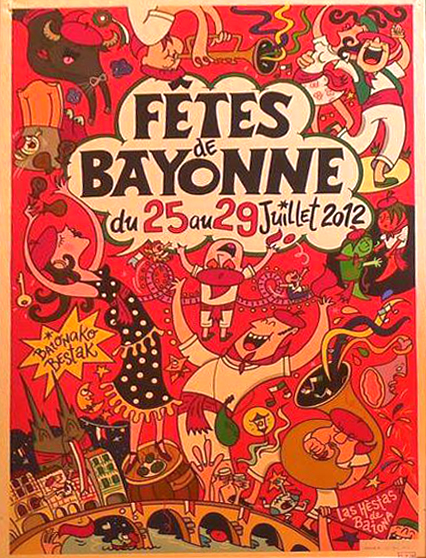18th August 2012. Things I see in the Pays Basque. (this could become a series!) I've been meaning to post this for a while - our local butcher, a stalwart of the community, has been advertising roast 'bif' sandwiches - as he spells it - on a placard outside his shop. His topical big seller while the London Olympics were on was the Big-Beñat..☺ It always made me smile.
Also this morning I saw something I would rarely, if ever, expect to see in the UK - a lady of a certain age.. and then some (I'd say 70+) zipping by on a moped - complete with helmet - bringing her shopping home from the Saturday market! "Hell's Grannies.."
Then there are these voitures sans permis - or light cars as we'd call them. No license required.. All is explained here. About the size of a large domestic appliance, they often sound as if they're powered by, at best, a small motorcycle engine or, at worst, an outboard motor.. They're driven by under-18s, grannies and grandads and by people who've lost their driving licences. In our more conventional eyes, they're under-powered anachronisms and their limited performance damns them.
 One of the many manufacturers of them here is Ligier - yes, the same company who used to race F1 cars. Aixam is another make I see often too. They could be described as a variable noise/constant speed car! They bumble around town at sub-orbital speed (max 45km/h) and, logically, have much to commend them. (There - I've said it!) We've all been brain-washed into thinking we need a car that will cruise at 160km/h in air-conditioned comfort with all the bells and whistles - whereas what we really need is a low cost and sustainable mode of transport.
One of the many manufacturers of them here is Ligier - yes, the same company who used to race F1 cars. Aixam is another make I see often too. They could be described as a variable noise/constant speed car! They bumble around town at sub-orbital speed (max 45km/h) and, logically, have much to commend them. (There - I've said it!) We've all been brain-washed into thinking we need a car that will cruise at 160km/h in air-conditioned comfort with all the bells and whistles - whereas what we really need is a low cost and sustainable mode of transport.
 Manufacturers know us all too well though and each year they tickle our senses with increasingly sophisticated gadgets - central locking, electric windows (ask yourself how long ago was it since you owned a car with wind-up windows?), parking assistance, air con, 6 speaker (or more) in car entertainment, 4x4, cruise control, leather seats, stop/start, alloy wheels, metallic paint, tinted windows etc etc - the list is endless. Trouble is, how many of us are prepared to abandon the more conventional cars we've become accustomed to in favour of something as small as these cars with their embarrassingly low levels of performance and equipment? I suspect very very few of us. I know I'm not - but perhaps we should be.
Manufacturers know us all too well though and each year they tickle our senses with increasingly sophisticated gadgets - central locking, electric windows (ask yourself how long ago was it since you owned a car with wind-up windows?), parking assistance, air con, 6 speaker (or more) in car entertainment, 4x4, cruise control, leather seats, stop/start, alloy wheels, metallic paint, tinted windows etc etc - the list is endless. Trouble is, how many of us are prepared to abandon the more conventional cars we've become accustomed to in favour of something as small as these cars with their embarrassingly low levels of performance and equipment? I suspect very very few of us. I know I'm not - but perhaps we should be.
 One of the many manufacturers of them here is Ligier - yes, the same company who used to race F1 cars. Aixam is another make I see often too. They could be described as a variable noise/constant speed car! They bumble around town at sub-orbital speed (max 45km/h) and, logically, have much to commend them. (There - I've said it!) We've all been brain-washed into thinking we need a car that will cruise at 160km/h in air-conditioned comfort with all the bells and whistles - whereas what we really need is a low cost and sustainable mode of transport.
One of the many manufacturers of them here is Ligier - yes, the same company who used to race F1 cars. Aixam is another make I see often too. They could be described as a variable noise/constant speed car! They bumble around town at sub-orbital speed (max 45km/h) and, logically, have much to commend them. (There - I've said it!) We've all been brain-washed into thinking we need a car that will cruise at 160km/h in air-conditioned comfort with all the bells and whistles - whereas what we really need is a low cost and sustainable mode of transport. Manufacturers know us all too well though and each year they tickle our senses with increasingly sophisticated gadgets - central locking, electric windows (ask yourself how long ago was it since you owned a car with wind-up windows?), parking assistance, air con, 6 speaker (or more) in car entertainment, 4x4, cruise control, leather seats, stop/start, alloy wheels, metallic paint, tinted windows etc etc - the list is endless. Trouble is, how many of us are prepared to abandon the more conventional cars we've become accustomed to in favour of something as small as these cars with their embarrassingly low levels of performance and equipment? I suspect very very few of us. I know I'm not - but perhaps we should be.
Manufacturers know us all too well though and each year they tickle our senses with increasingly sophisticated gadgets - central locking, electric windows (ask yourself how long ago was it since you owned a car with wind-up windows?), parking assistance, air con, 6 speaker (or more) in car entertainment, 4x4, cruise control, leather seats, stop/start, alloy wheels, metallic paint, tinted windows etc etc - the list is endless. Trouble is, how many of us are prepared to abandon the more conventional cars we've become accustomed to in favour of something as small as these cars with their embarrassingly low levels of performance and equipment? I suspect very very few of us. I know I'm not - but perhaps we should be.
19th August 2012. 6h30. Just about to set off on the mountain walk - I turned on the small kitchen TV a few minutes ago in time to catch the last minute of a programme on France 5 about the 4 masted barque Krusenshtern. This is the former German ship Padua (seized by Russia as war reparations and now used as a sail training ship) that Eric Newby would have known from his voyage aboard Moshulu, a similarly-sized barque in the S Australian wheat trade.
20th August 2012. A few creaks and groans from my knees this morning after yesterday's 15km in the mountains. The Météo forecast was for temperatures only in the mid 20s but the humidity was off the clock.
We were all drenched in sweat after ½hr or so - even our Basque guide.
He’s the son of one of the
wartime Comet guides, of which there were around 30 during WWII, and
they each had their own routes leading to the frontier crossing points. As security was stepped up, the guides had to stay one step ahead of the Germans
and this meant using paths/tracks that offered more & more concealment. We
were walking on tracks that, if they were any narrower, wouldn't be tracks! I think some of them were made by pottoks
(wild horses) but the majority were made by rabbits. Yesterday’s track was
probably too demanding for the group in September and I doubt if we’ll be using
it again.
It started off with a long steady
climb from just outside Espelette - first on a single track road, then onto paths littered
with loose rocks, before finally switching to tracks that were practically invisible. We didn’t ridge
walk (pity – we missed the views) but we skirted around the shoulders of the
hills on these rabbit tracks surrounded by high ferns. Very hard going.
I
wore shorts and those of us who did so all ended up covered in scratches – that
attracted endless persistent flies. I had a good sized walking stick with a spike in the end –
either that or a pair of ski poles is essential. I had 1½ litres of water and
that was just enough for yesterday but on a hot day, it
wouldn't have been. Had to sit down 2-3 times – my head was spinning. Don't
think I had enough for breakfast. We were up and down hill a lot.. the uphills
were killers in the humidity. Sometimes the ferns were shoulder high - a good
tip from the guide - grab hold of them during descents. I did and they're
surprisingly tough and good for stopping an out-of-control rush. I can't begin to imagine how they managed night crossings during the war.
Venta Burkaitz
The first cold San Miguel at the Venta Burkaitz in Spain hardly touched the sides! We were offered trout in garlic butter or piperade (my choice) to start - followed by lamb chops on the plancha or magret de canard (my choice)..



















_288x400.jpg)













